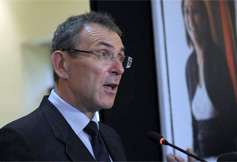Statement of Commissioner Piebalgs on the International development Committee's report on EU development assistance

"I take note with interest on the findings of the International Development Committee report on EU aid. I'm satisfied to note that it highlights the improvements we have made in our work; recognising that the 'Agenda for Change' - a new EU policy to focus our work on fewer sectors and direct more aid to the poorest countries where it can have the biggest impact - is helping to make our aid even more effective.
I am also pleased to see that the report underlines the clear advantages of giving money through the EU - namely that for Member States, it is cheaper, more efficient and can help them to work in countries where they would not otherwise have had the resources to work themselves. Indeed, in the current economic climate, it makes more sense than ever for Member States to carry out development work through the EU - helping to improve coordination and maximise the impact of our aid, making a difference to even more of the world's poorest people as a result.
However, it is simply not true to suggest that EU aid is going to the wrong people. People tend to forget that the Commission is not just an aid donor, unlike other aid agencies. An important part of our work is also to provide financial assistance to countries which are classified as developing countries and wishing to join the EU, both to support their reforms and to prepare them for implementing European standards and policies. This is delivered through separate instruments than the ones clearly aimed at fighting poverty – the Development Cooperation Instrument and the European Development Fund. With these instruments, around 65% of EU aid is going to Least Developed Countries. In addition to this, I have proposed to concentrate EU aid in the future to the poorest countries in the world, to make sure our money goes to the most in need and where it makes a real difference. In any case, the EU has a real interest in fighting poverty on its borders and beyond, where poverty can breed insecurity and instability. It is only by helping these countries create stable democracies with economic chances for its citizens that we can address the root causes of these problems, which are of interest to us all.
EU taxpayers must also be fully reassured that the Commission' has a strong track record of good management of its aid. In fact, EU administrative costs – correctly estimated at 5.4% on the basis of 2009 data - are lower than the average administrative costs of the principal donors for bilateral aid. It is about transparency and good management. It's important not to forget that EU aid has pulled millions of people out of poverty and saved countless lives over the last ten years.
I know there are some aid sceptics who would rather see money spent elsewhere. But what about the 1 million female students, most in sub-Saharan Africa, who have been able to enrol in secondary education thanks to Commission support? What about the 5 million children who won't have to suffer the consequences of measles, because we've helped get them vaccinated? What about the 31 million households now connected to drinking water?
We have a duty to European taxpayers and to people in developing countries to get the most from our resources. Not only is that good development policy, it makes sound financial sense as well. And tackling the root causes of poverty and insecurity to give developing countries and their people the opportunities they deserve will open up opportunities for us here in Europe too."















